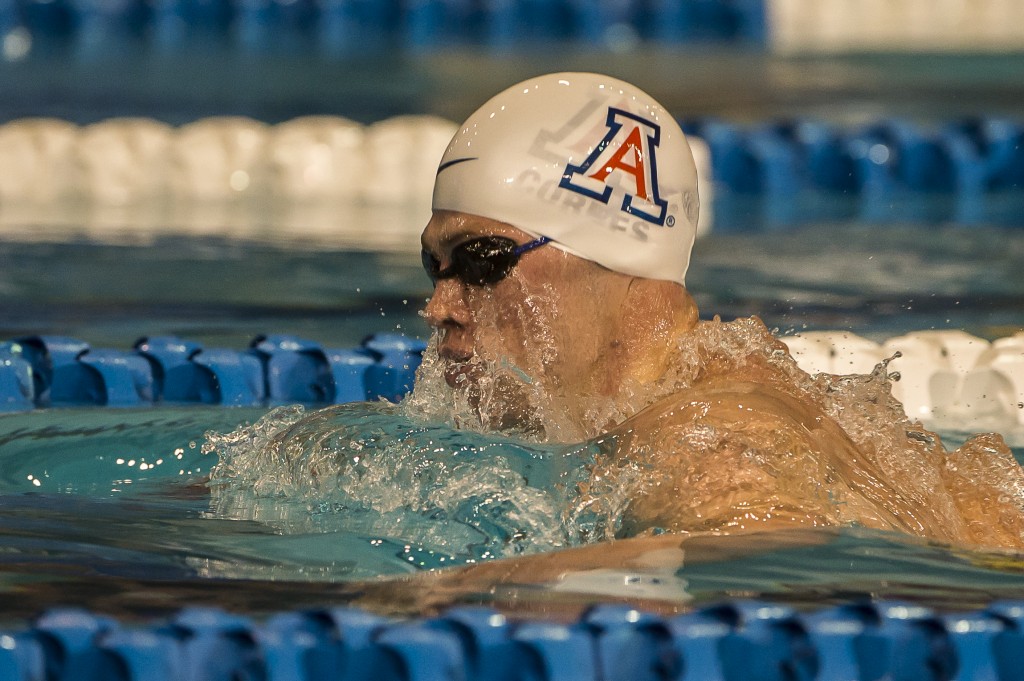3 Important Takeaways From NCAA Championships

By Christian Hanselmann
We all watched the NCAA Championships last month. We all know about the disqualifications. We know about the records. We know about the intense team races that took place. The speed on display the past two weekends was awe-inspiring.
With all that in mind, I re-watched the meets for the “take-home” messages from NCAAs. These are more subtle and more in-depth and applicable. My idea is that swimmers and coaches can see examples of important swimming principles in the meets and make necessary changes (disclaimer: consult with coach before making any training or technique changes).
Message #1: Speed is efficient
Kevin Cordes obliterated the 100 breaststroke with a 50.04, which has seemingly become old-hat for the 6-5 Arizona Wildcat. The most impressive part about this swim is his efficiency. Last year, he took one more stroke per 25 than he did this year.
This exemplifies the ironic relationship that stroke count and time have. It is not necessarily true that more strokes equate to a faster swim. This is difficult to understand and requires some tinkering with to make it work. I can take 3 strokes per 25 or 25 strokes per 25, but somewhere in the middle is the happy medium that is peak speed.
As a second part to this message, technique is crucial to being efficient. Margo Geer’s freestyle is incredibly efficient and therefore incredibly fast. I admit that I had never noticed this, but I usually think of more muscular swimmers being sprinters. Margo is the antithesis of my stereotype. Rather than muscling her way through the water, she uses her levers to propel herself efficiently.
Message #2: Turn weaknesses into strengths
Chase Kalisz annihilated the 400 IM with a 3:34.50. But how about the changes from 2013 to the 2014 edition of Chase Kalisz? In 2013, he was in seventh after the 200 as opposed to this year, when he was first. He was 2 seconds faster at the 200 mark this year.
In the IM, it is so crucial to strengthen a swimmer’s weaknesses, yet still swim the race to their strengths. He did just that. He blew everyone out of the water with his back-half, but his “weak strokes” were the key in his record-shattering performance.
The same could be said about any race. Analyze and figure out what could be better. There are certainly things that can be improved that will positively affect the result over the next year. Chase will most likely analyze his race and find something to do better. As should every other swimmer. Decide what needs to be improved and start working on it.
Message #3: Be aggressive
It takes confidence and trust in training to swim fast from the beginning. So many swims exemplified this confidence. Just to name a few: Missy Franklin’s 200 freestyle, Brittany Maclean’s 1650 freestyle, Emma Reaney’s 200 breaststroke, Christian Quintero’s 500 freestyle, Ryan Murphy’s 200 backstroke, and Dylan Bosch’s 200 fly.
If a swimmer trains for it, they can do it. Our bodies are incredible and can do a lot more than we think they can. This does not mean go out as hard as possible in a race. This means train harder to race harder (and smarter). Coaches and swimmers need to communicate so that swimmers trust that what they are doing will result in a desired performance.
On the other hand, trust the training at the end of the race, too. Felicia Lee, in the 100 butterfly, was able to finish well because of her training and her confidence. Felicia was in sixth at the 50, but came back and passed the field to win the race. Another plug for technique: technique wins races. Often, when a swimmer gets tired, their technique starts to deteriorate. When their technique starts to deteriorate, their speed will slow. Felicia held her technique the entire race.
I love watching NCAAs. I’ve waited for them to come on TV every year just to watch the fastest swimmers in the world perform. For the swimmer in me, it was motivating to see people swimming so fast. For the coach in me, I hope that swimmers can see it as motivational. All around, the NCAA Championships have been progressively faster from top to bottom every year. Swimmers should not be discouraged about this. Let it motivate to improve.
Christian Hanselmann swam for three years with the Brigham Young Cougars, and is currently pursuing a Master’s in Sports Psychology.



